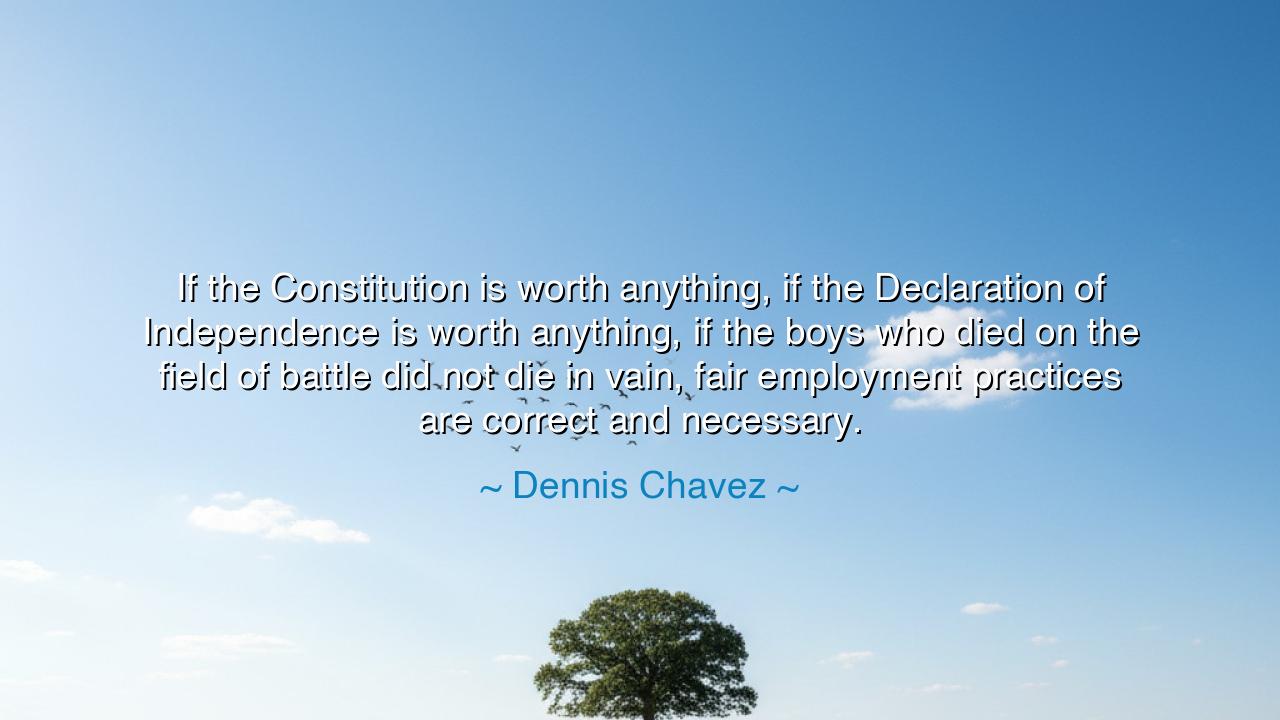
If the Constitution is worth anything, if the Declaration of
If the Constitution is worth anything, if the Declaration of Independence is worth anything, if the boys who died on the field of battle did not die in vain, fair employment practices are correct and necessary.






When Dennis Chávez proclaimed, “If the Constitution is worth anything, if the Declaration of Independence is worth anything, if the boys who died on the field of battle did not die in vain, fair employment practices are correct and necessary,” he spoke not merely as a lawmaker, but as a keeper of the nation’s conscience. His words are both a challenge and a reminder — that the great promises of America mean nothing unless they are made real in the daily lives of her people. In this single sentence, Chávez joins the eternal voices of justice: those who demand that freedom and equality not remain as words in parchment, but as living truth in the hearts and homes of every citizen.
The origin of this quote lies in the mid-twentieth century, during the heated debates over civil rights and labor equality in the United States. Dennis Chávez, the first Hispanic American elected to a full term in the U.S. Senate, was a tireless champion of fairness in employment and social justice. He introduced legislation to outlaw racial and religious discrimination in hiring and wages — measures that would later become the foundation of the Civil Rights Act. His statement was a direct rebuke to hypocrisy: to those who praised the Constitution and the Declaration of Independence in words, yet refused to extend their principles to all men and women.
Chávez understood that the spirit of independence did not end with the Revolution — that it demanded renewal in every generation. He asked his countrymen to consider whether the sacrifices of soldiers — those “boys who died on the field of battle” — had any meaning if freedom did not include justice in the workplace, dignity for the worker, and equality for all races. For what is liberty, he asked, if a man may die for his country but not be hired because of the color of his skin? What is independence if opportunity is reserved for the few? Thus, Chávez wove the struggles of his own time into the fabric of America’s founding ideals — reminding all that freedom is hollow without fairness, and patriotism without justice is mere sentiment.
In his words, there echoes the wisdom of the ancients. For even Aristotle taught that the health of a state depends on the justice with which its citizens are treated; and Cicero declared that the law which does not protect the weak is no law at all. So too did Chávez understand that equality in labor was not merely an economic concern, but a moral covenant. A nation that honors its heroes must also honor its workers; for both defend the same ideal — the right of every person to live and labor with dignity. His appeal, therefore, was not just political but spiritual: a call to restore the sacred balance between the nation’s words and its deeds.
History gives us countless mirrors of this truth. Consider Abraham Lincoln, who in his youth split rails with his own hands and later declared that labor is “prior to and independent of capital.” He saw, as Chávez did, that the worth of a nation is measured not by its wealth, but by its treatment of those who build it. When Lincoln freed the enslaved, and when Chávez sought fairness for the laborer, both were affirming the same truth: that the promises of the Declaration of Independence — life, liberty, and the pursuit of happiness — are not privileges for a few, but the inheritance of all.
Yet Chávez’s words also carry a warning — that these ideals must be defended continually. He knew that injustice often hides behind the mask of peace and prosperity. He reminds us that the Constitution is not self-enforcing, nor the Declaration self-fulfilling; they are living covenants that depend upon the courage of the people to give them power. The soldiers who died for freedom did their part; it remains for the living to ensure that their victory is not betrayed by prejudice or complacency. Fair employment practices, then, are not mere laws — they are the modern battlefields where equality must still be won.
So, my children of liberty, take this teaching to heart: freedom is not complete until it is equal. Let no man praise the Founders while denying their vision in his actions. Let no woman enjoy opportunity without extending it to her neighbor. Each generation must ask itself, as Chávez once did, whether the Constitution still breathes with meaning, or whether it lies silent while injustice reigns. And if ever you find that the words of your nation’s founding have grown dim, kindle them again — with courage, compassion, and the steadfast belief that justice is the truest form of patriotism. Only then will the sacrifices of the past, and the hopes of the future, be one and the same flame.






AAdministratorAdministrator
Welcome, honored guests. Please leave a comment, we will respond soon